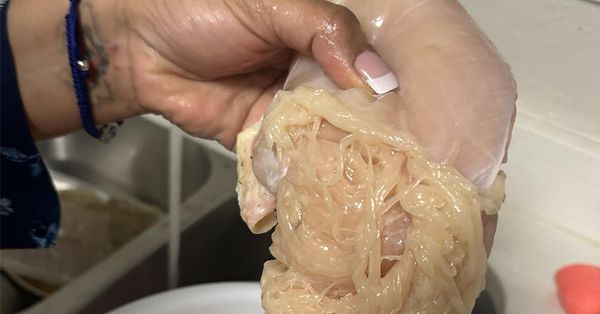
A mother preparing dinner was left stunned when the chicken she was washing for cooking started to separate into stringy pieces, resembling spaghetti. This unexpected turn of events has caught people’s attention, and it is raising questions about the meat industry. Is this a sign to consider adopting a vegan lifestyle? Let’s dive deeper into this unusual occurrence.
Alesia Cooper, a mother from Irving, Texas, shared a disturbing photo on Facebook. The image shows a chicken breast falling apart into spaghetti-like strands while she was preparing it for cooking. Cooper purchased the chicken breast from a budget supermarket, Aldi. She humorously suggests the chicken might be fake meat, which has prompted a viral response. Some netizens are convinced that lab-grown or genetically modified meat is to blame for this bizarre incident.
However, there is a more logical explanation for the shredded chicken breast. The phenomenon of “woody breast” and “spaghetti meat” can be attributed to the breeding practices used to produce bigger-breasted chickens. The meat industry aims to maximize profits by increasing the amount of meat per bird, but it comes at the cost of the chickens’ well-being. These fast-growing chickens develop abnormalities due to excessive growth hormones, resulting in meat that is hard and chewy or stringy in texture.
While consuming “woody breast” or “spaghetti meat” might not harm humans, it is important to recognize the impact it has on the chickens. These birds struggle to support their oversized bodies with their tiny legs, leading to a variety of welfare issues. The demand for white meat has driven the industry to prioritize large-breasted chickens, resulting in such abnormalities.
The growth rate of broiler chickens (chickens raised for meat) has significantly increased over the years. This trend is driven by consumer demand for white meat products like chicken nuggets and sandwiches. As a result, chickens are reaching market weight faster and are now much heavier. The average chicken in 2000 weighed 5.03 pounds at 47 days old, while in 2023, it weighs 6.54 pounds at the same age. This shift reflects the industry’s need to meet consumer preferences for larger breast meat.
Though fast-food chains and grocery stores have contributed to the demand for larger breasts, there is a growing movement advocating for meat from slower-growing chickens. These companies argue that allowing chickens more time to grow before slaughter leads to a healthier and tastier end product. As people become more aware of these issues, they are seeking alternatives like buying meat from local butchers or co-ops.
The reaction to the stringy chicken incident has been mixed, with some expressing disgust and others considering dietary changes. Many online users are concerned about the quality of the meat they are consuming and are reconsidering their choices. Some individuals have even decided to transition to a vegan or pescatarian lifestyle in response to these revelations. It is evident that factory farming practices are causing immense pain and suffering to these animals.
This incident serves as a wake-up call for all of us to be more mindful of our food choices. By choosing to support ethical and sustainable practices in the meat industry or exploring alternative diets, we can make a positive impact on both our health and the welfare of animals.




